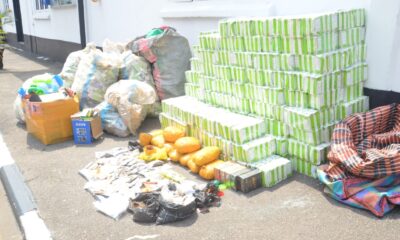Analysis
The Navy N200m Seizures And ‘Operation Water Guard’

BY EGUONO ODJEGBA
In the efforts to re-engineer, improve and strengthen some of its roles, both statutorily assigned roles and or otherwise appropriated by show of force and love for country, the Nigerian Navy in the past two months made two jaw sapping statements.
First was the announcement late October by the NNS BEECROFT to the effect that its operatives intercepted a large consignment of cannabis sativa known in local parlance as igbo, wee-wee or marijuana, reportedly along the Badagry and Lekki waters respectively, with an estimated street value of N200 million.
The Navy told journalists that the drug was being ferried into Nigeria through the backwaters by suspected smugglers when the consignments were intercepted. Efforts to cross check with the National Drug Law Enforcement Agency (NDLEA) to confirm the reported quantity of the seized substance together with its price has so far been unsuccessful.
According to the naval authority, the illicit substances which were stacked in 65 sacks were intercepted with the aid of Falcon Eye, a state-of-the-art maritime awareness domain facility technology owned and operated by it.
However, Commodore Kolawale Oguntuga, Commander of the Nigerian Navy Ship (NNS) BEECROFT addressing newsmen in Lagos reportedly said the smugglers of the items fled upon sighting the naval gunboats on patrol of the areas.
His words “With the aid of Falcon Eye, the navy is able to monitor or mount surveillance on the nation’s waters. The navy gunboats are constantly on patrol to ensure that criminals stay away from our waters and make it safe for trade.
“It is also it’s responsibility to defend the integrity of the nation. This we have demonstrated with the seizure of the large consignment of drugs,” he said.
The Navy’s second hit action was the unveiling two weeks ago of a special task team codenamed “Operation Water Guard” purportedly designed to tackle economic water borne criminalities within the Lagos territorial waters.
The Flag Officer Commanding Western Naval Command, Rear Admiral MB Hassan while inaugurating the operation reportedly said the exercise was set up to protect the nation’s economy.
The operation according to the FOC is primarily to combat smuggling, piracy, oil theft, and other illicit activities plaguing the Lagos maritime space.
He said “In response to the escalating maritime threats, Operation Water Guard is a strategic initiative aligned with the Navy’s mandate to ensure the safety of Nigeria’s maritime environment. The operation specifically targets the Badagry water and land axis around Ashipa, a border community to the Benin Republic.
“The operation would further ensure the nation’s maritime domain would be conducive during the yuletide period and beyond. We solicit support, especially from the communities. This operation would not add to already established checkpoints along the road but we will employ intelligence-led checks which would complement the sustained presence at sea”, adding:
“We are working with sister agencies towards achieving the common goal of safeguarding our nations. We are employing a lot of intelligence and it is working.”
Incidentally, also speaking during the inauguration, the Commander, NNS Beecroft, Commodore Kolawole Oguntuga, stated that the OP WG stands as a testament to the Nigerian Navy’s unwavering commitment to maritime security and the desire to protect the nation’s economic prosperity, adding:
“The Nigerian Navy has arrested contraband goods, particularly Premium Motor Spirit, drugs, and foreign parboiled rice worth billions of Naira. These could have affected the availability of petroleum products as well as jeopardized the efforts of small and medium-scale enterprises. The drugs in particular could have further affected the health and stability of the citizens.”

While these bold initiatives are commendable and will no doubt bolster the nation’s overall economic security architecture, it is nonetheless worrisome that some of these initiatives are becoming pedestrian especially as they constitute flagrant trespass, figuratively speaking, to the primary roles of sister institutions of state.
It is doubtful if the Nigerian state needs these unnecessary tasks overlap, rivalry and the attendant show of force which the Navy can better deploy combating the more significant economic crime of crude and fish smuggling off the beach axis, right into the high sea where big smuggling traffic thrives with seeming absolute comfort; to the extent of even making yanga on top.
It is even more worrisome that the navy is introducing a fresh dimension to the safety of cosmopolitan economic activities like fishing and waterways transportation within riverine creeks and communities in the state, in addition to the security scare created by indiscriminate burning of suspected smuggled petty items along the waterways and shores.
Barely two weeks ago operatives of the Nigerian Navy Forward Operating Base Badagry allegedly opened fire on two commercial boats on the suspicion that they were laden with petrol, and which ignited a big inferno that reportedly caused great public panic as the incident happened close to the Badagry main market; which is intertwined with the township and it’s entire population.
While the incidental duty of the Nigerian Navy relating to the nation’s economic wellbeing which includes surveillance and patrols of our territorial waters is not in doubt, at a time of great economic imbalance caused by large scale crude smuggling and large scale illegal fishing which is international in scope and hence posses real and direct economic threat to our sovereignty; the naval authority need not be told that as an arm of the Nigerian Defence, its priority responsibility is such incursion on our sovereign economy, which act challenges our collective survival; which is the real big fight for a major organ of national defence such as the navy.
Other agencies including civil defence, marine police, the narcotic department and customs marine should be left to prosecute the small, small fights along the creeks, lagoon and the waterways; as clearly enshrined in the acts setting them up.
The navy is too big and too serious an organization to focus on chasing after rice smugglers and smugglers in jerry cans of fuel along Badagry/Bar Beach/Lekki/lkorodu creek and lagoon; where other statutory agencies already aforementioned are supposed to be more active.
It is also very laughable that the present pastime of the navy is catching of illegal migrants and stowaways on ships; which it celebrates with fanfare as though an enemy state submarine with war heads have been captured.
The actual war to protect Nigeria’s economy lies farther ashore up to the exclusive economic zone; that should be the main focus of the navy, not the other way around; where it likes to show off and calls customs, civil defence or the narcotic agency occasionally to dash them items of seizure.
When the naval authority claimed the seizures in fuel, rice and marijuana it recorded in the past two months is about N200 million, and a further claim of seizures worth billions of naira, the naval authority was expected to also show case these seizures. Doing so would give its claim the credibility it deserves; since anyone can make claims just to be heard.
Nigerians have a mental picture of seizures that is worth billions of naira, and also can accurately assess the said seizures to determine which one is real time as against the display of old and over time seizures; which has become a recurring decimal of recent, amongst a number organization for obvious reasons. Where is the billion naira worth of seizures made by the navy?
Equally interesting is the claim by Navy that the contraband consignments were intercepted with the aid of its Falcon Eye-the navy’s anti-corruptible search capability facility that has however apparently proved incapable in identifying the locations of large scale crude and fish smuggling, and illegal ship-to-ship transshipment.
Perhaps, the effort to shore up its sagging image after series of related operational misdemeanours, may have triggered these loud throttling race, as possible remedial measures to regain its old grooves as gentlemen officers of the sea.
Between June and August this year, some of its show of force and unnecessary attempts to allegedly impugn the character of critical partners in the joint prosecution of a focused anti crude smuggling war were considered out rightly ridiculous by some segments of the society.
But neither would this small fights and apparent rivalries return the navy’s once terrific fine public image to its enthralling dignify appearances, which similar feelings its sparkling white uniform often engenders.
We love our NN and long to return to the days of old with beautiful stories of its exploits in all fronts. Perhaps, for now, the navy new leadership should focus more on its primary hydrographic survey and at the economic security front, simply return to the high sea to checkmate trafficking in crude and fish smuggling.





























